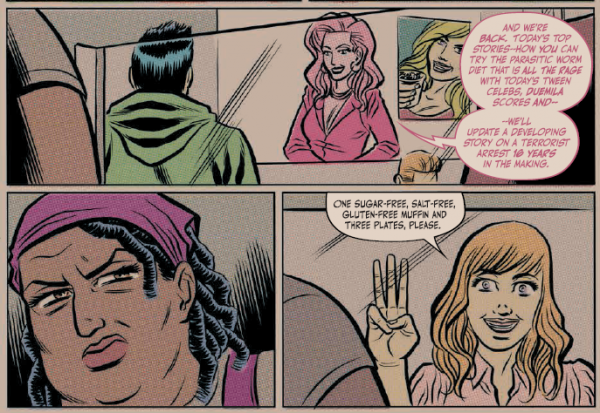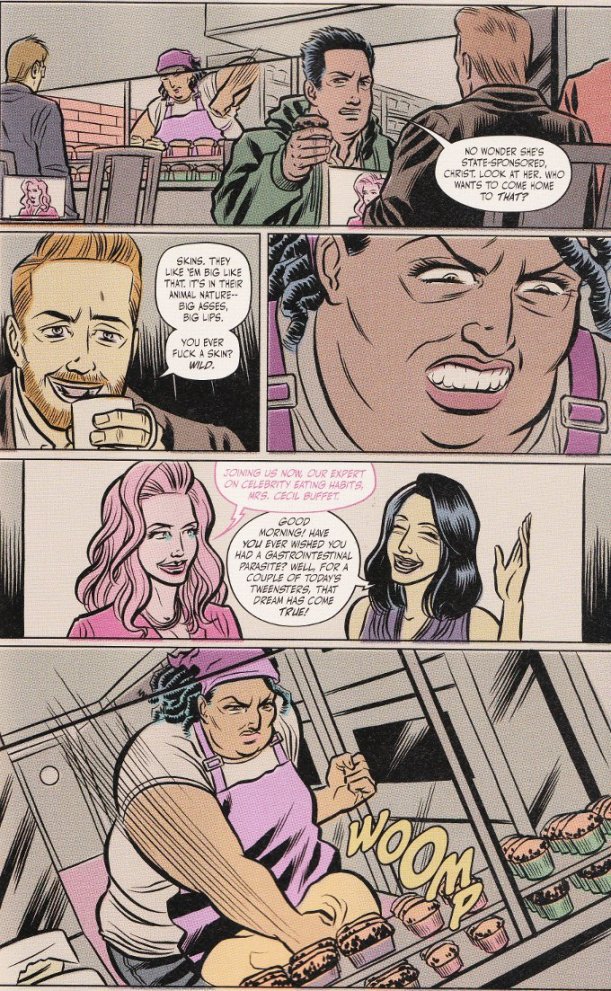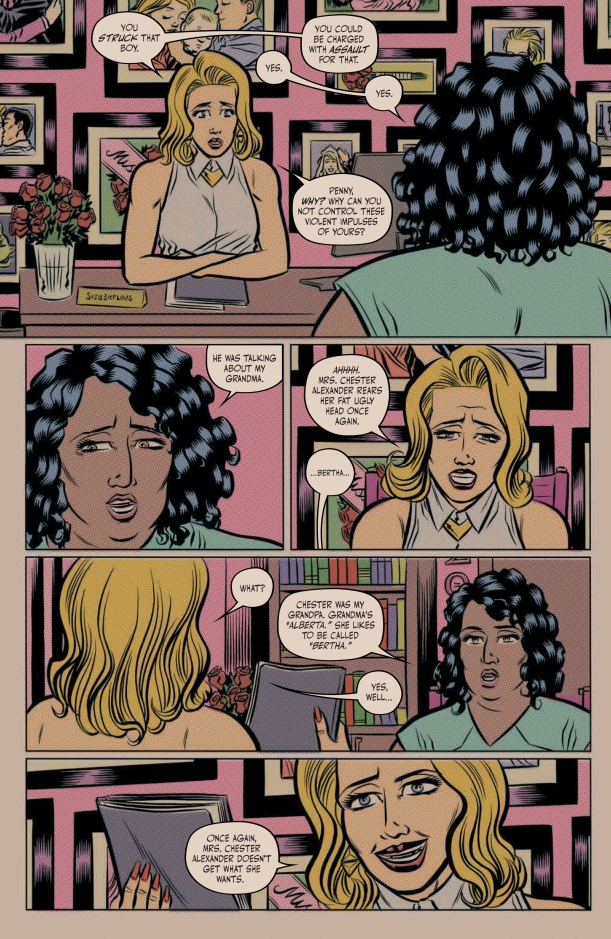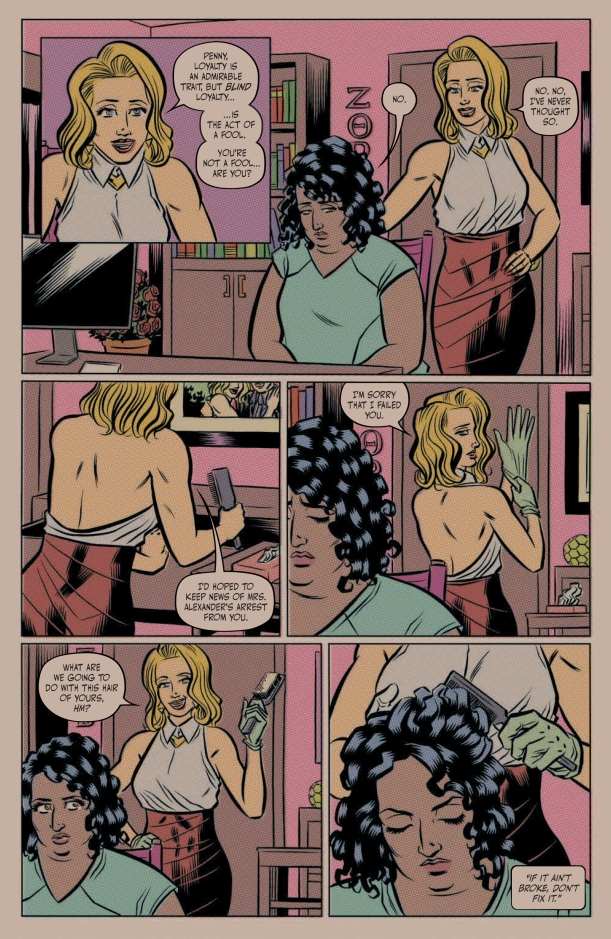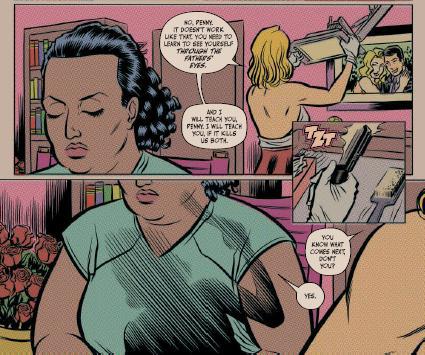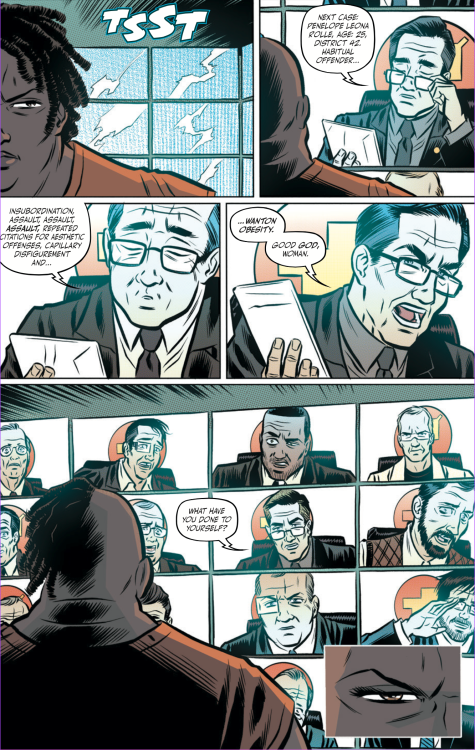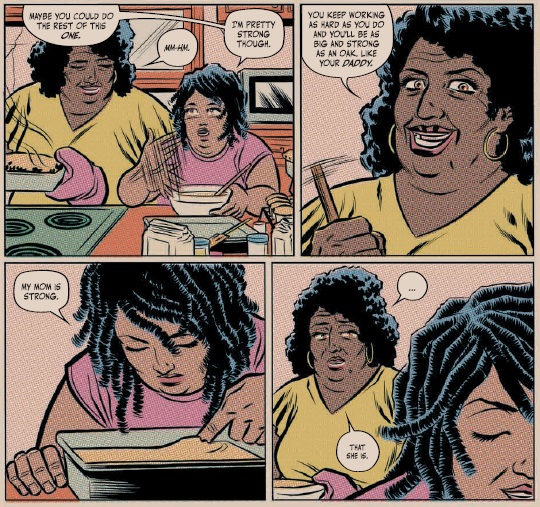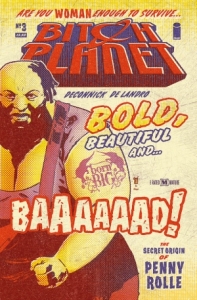 In Bitch Planet Issue 3, Kelly Sue DeConnick teams with guest artist Robert Wilson IV to present the events that lead to Penny Rolle landing in the eponymous outpost penitentiary. Did she kill someone considering her frequent entries into melee with guards? Did she do something equally dangerous within society? Well, yes, but not at all what a reader might expect. Spoilers ahead! If you’d like to read part 1 of this analysis, click here. You can find part 2 here. And part 3 here.
In Bitch Planet Issue 3, Kelly Sue DeConnick teams with guest artist Robert Wilson IV to present the events that lead to Penny Rolle landing in the eponymous outpost penitentiary. Did she kill someone considering her frequent entries into melee with guards? Did she do something equally dangerous within society? Well, yes, but not at all what a reader might expect. Spoilers ahead! If you’d like to read part 1 of this analysis, click here. You can find part 2 here. And part 3 here.
Pages 20-21
The two infuriating conversations continue. The woman who ordered the absurd muffin to split three ways is now calorie counting with her two companions. 15 calories each. One brags that she “evac’d 12 ounces two days in a row” using a toilet scale. The blond remarks that she envys her bowls. Gross. The other, a brunette, says she’d trade them for the blond’s hair. This is what compliant women do–deflect praise with another compliment, saying my good isn’t as good as your good. Also gross. Intercut is the racist man at the other table finishing his analogy from the previous page, spelling out oh so clearly that having sex with a “skin” is akin to the same with a baboon. (Wow. What a total douchebag.)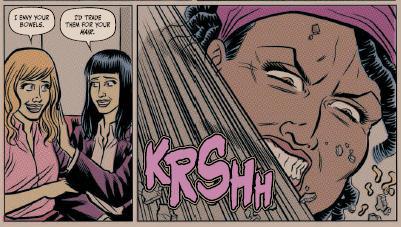
The dough cannot absorb Penny’s rage. She busts out from behind the counter, cracks the screen playing The Feed, and yells at both tables to get out. The racist calls her a crazy bitch. The guy who had complained about the late open tells her he’s calling the cops on her–“Your life is over!” “Good!” Penny responds and cracks the racist’s jaw with her rolling pin. “I didn’t much like this life anyway.”
This is, of course, the act that is going to get her thrown into Bitch Planet. But I’m not sure Bitch Planet is any worse than what her life was like before. In some ways, the outpost is more straightforward about its expectations. It’s more real, despite the giant pink holograms.
Pages 22-23
The three women are in panic. Penny repeats to them to get out. She adds, “And take the muffins!”
But that’s not the important part of this page, just a funny closing to the previous bit of action. The Feed is still playing, though the screen is now cracked in the shape of a spider’s web. They’ve come back to the story of the terrorist arrest. The image of a large, muscular white man with blond, curly hair, including a ringlet that hangs in his face just like Penny’s is shown while snippets of info get presented: “44-year old,” “gender terrorist,” miscegenation,” and “the size of an oak.” This has to be Penny’s father. She looks at the screen in shock and dismay. Then she touches that non-compliant lock of hair. Now the government has everyone in her family. She’s alone.
Also, I want to know more about how I can become a gender terrorist.
Back in the present, the guards are finishing hooking up the ideal-self-image machine. The images of the judges has been replaced by images from her past. The woman from The Feed, one of the split muffin women, a woman who must be Penny’s mother, Penny’s father, the guy who threatened turned her in to the cops. It is unclear if she is visually zoning out the judges or the machine has read these memories and is projecting them.
Penny begins to think, “I wish you could see me…”
The judges’ voices now come in as a broadcast, at a distance. They tell her it’s time, that “visualization is key to achieving our objectives,” that they are trying to help her. She exclaims, “No!” and emphasizes how much this is a violation of her mind by the government.
Penny then finishes the thought, “…the way I see myself.” I’m unclear whether this is her own thought or an echo of a mentor, like her mother.
Page 24
The final page reveals that her “Idealized Actualization” is the exact woman she already is, except laughing heartily and without the machine hooked to her.
The judges are surprised. One asks if this is a mistake. Another says to send her to the outpost, that this is a waste of time.
Penny thinks back to her grandmother’s words: “If it ain’t broke, don’t fix it.” She adds, “I ain’t broke…And you bastards ain’t never gonna break me.” The issue ends with the great Penny smile we know and love.
Now, I wasn’t surprised by the reveal. But that didn’t matter much, because when it comes to women and self-image, having an idealized self-image that matches what we really are is akin to a superpower. It is truly difficult to accept our bodies as they are without any caveats or wishes that some small part wasn’t different. The images of media we are surrounded by continually point us to an image that a minuscule number of women can actually meet. So here we have a mixed race woman who doesn’t meet any of the beauty standards of her society. She’s been robbed of her family, but she is confident in who she is. She has both the body and the mind of an oak, inherited from that family she remains loyal to.
Seriously, she is my hero. And her powers of self-acceptance are rival to the combination of flight, invulnerability, and strength Wonder Woman has.

